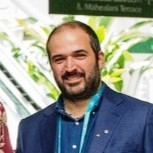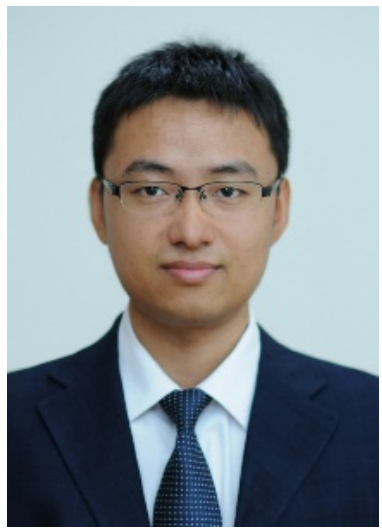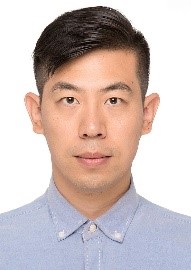
Information Collection Form (Keynote Speeches, ICWPT 2022)
|
Suggested Time |
TBD |
|
Title of Speech |
Wireless Power Transmission for Space Exploration |
|
Name(s)/Title(s) of Speaker(s) |
Nuno Borges Carvalho |
|
Photo(s) of Speaker(s) |

|
|
Abstract of Speech |
In this talk, the use of wireless power transmission is discussed within the space exploration topic. Topics such as space-based power satellites, including energy efficiency discussion in these links and how to optimize them. |
|
Bio(s) of Speaker(s) |
Nuno Borges Carvalho (S’97–M’00–SM’05-F’15) was born in Luanda, Angola, in 1972. He received the Diploma and Doctoral degrees in electronics and telecommunications engineering from the University of Aveiro, Aveiro, Portugal, in 1995 and 2000, respectively. He is currently a Full Professor and a Senior Research Scientist with the Institute of Telecommunications, University of Aveiro and an IEEE Fellow. He coauthored several books including Wireless Power Transmission for Sustainable Electronics (Wiley, 2020). He has been a reviewer and author of over 400 papers in magazines and conferences. He is the Editor in Chief of the Cambridge Wireless Power Transfer Journal, an associate editor of the IEEE Microwave Magazine He is a Distinguished Lecturer for the RFID-Council and was a Distinguished Microwave Lecturer for the IEEE Microwave Theory and Techniques Society. In 2022 he is the IEEE-MTT President-Elect.
|
|
Suggested Time |
TBD |
|
Title of Speech |
TBD |
|
Name(s)/Title(s) of Speaker(s) |
Hongjie Wang |
|
Photo(s) of Speaker(s) |
|
|
Abstract of Speech |
TBD |
|
Bio(s) of Speaker(s) |
Hongjie Wang (Member, IEEE) received the B.S. degree in electrical engineering from the University of Shanghai for Science and Technology, Shanghai, China, in 2009, the M.S. degree in electrical engineering from Shanghai Jiaotong University, Shanghai, China, in 2012, and the Ph.D. degree in electrical engineering from Utah State University, Logan, UT, USA, in 2018. From 2012 to 2014, he was a Senior Researcher with China Electric Power Research Institute, working on intelligent high voltage equipment developing and standardization. After graduation in 2018, he was a Postdoc Researcher with Utah State University for one year. Since 2019, he has been an Assistant Professor with Electrical and Computer Engineering Department, Utah State University. At USU, he serves as the Co-Director of Utah State University Power Electronics Laboratory (UPEL). He holds multiple U.S. patents. His current research interests include dc power distribution, analysis, design and control of resonant converters, extreme fast charging, grid interface power converter, health monitoring and diagnosis of power converters, and dynamic wireless power transfer for transportation electrification applications. Dr. Wang is a reviewer for multiple IEEE transactions, journals, and grant panels. |
|
Suggested Time |
TBD |
|
Title of Speech |
TBD |
|
Name(s)/Title(s) of Speaker(s) |
Daniel Ludois |
|
Photo(s) of Speaker(s) |
|
|
Abstract of Speech |
TBD |
|
Bio(s) of Speaker(s) |
Daniel Ludois (Senior Member, IEEE) received the B.S. degree in physics from Bradley University, Peoria, IL, USA, in 2006 and 2008, respectively, and the M.S. and Ph.D. degrees in electrical engineering from the University of Wisconsin–Madison (UW-Madison), Madison, WI, USA, in 2008 and 2012, respectively.,He cofounded C-Motive Technologies Middleton, WI, USA, in 2012, a company developing capacitively coupled power conversion technologies. C-Motive is currently working to commercialize electrostatic machines. In 2013, he joined the faculty of the Department of Electrical and Computer Engineering, UW-Madison, where he is currently a Jean van Bladel Associate Professor. He is also an Associate Director of the Wisconsin Electric Machines and Power Electronics Consortium (WEMPEC), Department of Electrical and Computer Engineering, UW-Madison. He has coauthored four IEEE prize articles. His interests include power electronics, electric machines, applied electromagnetics, and entrepreneurship.,Dr. Ludois received the USA National Science Foundation CAREER Award in 2015 and was named as a Moore Inventor Fellow by the Gordon and Betty Moore Foundation in 2017. |
|
|
|
|
|
|
|
Suggested Time |
TBD |
|
Title of Speech |
TBD |
|
Name(s)/Title(s) of Speaker(s) |
Udaya Madawala |
|
Photo(s) of Speaker(s) |
|
|
Abstract of Speech |
TBD |
|
Bio(s) of Speaker(s) |
Udaya Madawala (Fellow, IEEE) received the B.Sc. degree in electrical engineering (Hons.) from the University of Moratuwa, Moratuwa, Sri Lanka, in 1986, and the Ph.D. degree in power electronics from The University of Auckland, Auckland, New Zealand, in 1993, as a Commonwealth Doctoral Scholar.,In 1997, he joined the Department of Electrical and Computer Engineering, University of Auckland, where he is a Full Professor at present. His research interests are in the fields of wireless power transfer, power electronics, V2G applications, and renewable energy. |
|
Suggested Time |
TBD |
|
Title of Speech |
TBD |
|
Name(s)/Title(s) of Speaker(s) |
Josh Yank |
|
Photo(s) of Speaker(s) |
|
|
Abstract of Speech |
TBD |
|
Bio(s) of Speaker(s) |
Josh Yank is the Chief Executive Officer of Yank Technologies. |
|
Suggested Time |
15 minutes |
|
Title of Speech |
The Commercial Value of Wireless Charging |
|
Name(s)/Title(s) of Speaker(s) |
Daniel Yu, Founder and CEO |
|
Photo(s) of Speaker(s) |
|
|
Abstract of Speech |
As the world’s transport is increasingly electric and autonomous, charging needs to be everywhere and easy to use. To accelerate the adoption of wireless charging which delivers this future, we need to clearly state for customers the benefits of wireless. These benefits can vary for different use cases. We share our years of experience developing solutions with customers and explain why wireless charging will become the default form of charging in the future. |
|
Bio(s) of Speaker(s) |
CEO & Founder of IntDevice (NZ) Limited.
Daniel founded IntDevice 9 years ago and has been a serial entrepreneur, with expertise in wireless power transfer and customer-focussed research and development. He has over 20 years’ experience working for several global technology companies.
He has a Masters in Engineering from the University of Auckland. |
|
Suggested Time |
TBD |
|
Title of Speech |
Key technologies of high frequency wireless power transfer system |
|
Name(s)/Title(s) of Speaker(s) |
Prof. Yijie Wang |
|
Photo(s) of Speaker(s) |

|
|
Abstract of Speech |
With the fast development in wireless power transfer (WPT) technology, more and more needs are raised, such as high spatial freedom, long transfer distance, small occupied space and so on. High frequency power conversion technology provides a very effective means to improve the performance of WPT system. The operating frequency of WPT system gradually increases to several MHz and even tens of MHz. However, during the increment of operating frequency, many issues need to be solved such as high switching loss, high driving loss and high magnetic loss. This talk presents the overview and corresponding key technologies of high frequency wireless power transfer system. Firstly, the advanced inverter and receiver topologies are analyzed, which can achieve low switching loss with the soft-switching characteristics. Secondly, different from the square-wave driving method in low frequency situation, resonant driving method shows good efficiency performance when it is used in high frequency situations which can fully recycle the input capacitance energy. Thirdly, the air-core magnetic coupling and capacitive coupling ways show well application potential under high frequency situations. Finally, the development trend and challenges of high frequency resonant converter technology are discussed, such as high efficiency and high power density approaches, multi-band transmitter or receiver, far-field WPT system, and magnetic optimization for large space transmission in 2D and 3D conditions.
|
|
Bio(s) of Speaker(s) |
Prof. Wang received the B.S., M.S., and Ph.D. degrees in electrical engineering from the Harbin Institute of Technology, Harbin, China, in 2005, 2007, and 2012, respectively. From 2012 to 2014, he was a Lecturer with the Department of Electrical and Electronics Engineering, Harbin Institute of Technology. From2014 to 2017, he was an Associate Professor with the Department of Electrical and Electronics Engineering, Harbin Institute of Technology. Since 2017, he has been a Professor with the Department of Electrical and Electronics Engineering, Harbin Institute of Technology. His research interests include dc– dc converters, soft-switching power converters, power factor correction circuits, digital control electronic ballasts, and LED lighting systems. Prof. Wang is an Associate Editor of the IEEE TRANSACTIONS ON INDUSTRIAL ELECTRONICS, the IEEE JOURNAL OF EMERGING AND SELECTED TOPICS IN POWER ELECTRONICS, the IEEE ACCESS, the IET Power Electronics, and the Journal of Power Electronics. |
|
Suggested Time |
TBD |
|
Title of Speech |
Electromagnetic Energy Flow Analysis of Wireless Power Transfer Systems |
|
Name(s)/Title(s) of Speaker(s) |
Xian Zhang/Professor, Ph. D. |
|
Photo(s) of Speaker(s) |

|
|
Abstract of Speech |
Wireless power transfer is an emerging multi-disciplinary and strong cross-research field with electromagnetic theory as the core. There are many methods to explain the working principle of wireless power transfer. Previous research has established a number of appellations and definitions. By analyzing the general characteristics of electromagnetic energy flow of basic electrical components, this keynote speech explains the electromagnetic energy flow model for wireless power transfer. It explores the fundamental nature of spatial magnetic field coupling and obtains the key factors and basic definition of the wireless power transfer. Finally, it describes the working mode of wireless power transfer in electromagnetic near-field area from the viewpoint of electromagnetic energy flow. Provides implications for revealing the general principles of wireless power transfer technology. |
|
Bio(s) of Speaker(s) |
Xian Zhang, Ph.D., Professor of Hebei University of Technology. He is now the board member of the China Electrotechnical Society (CES), the secretary-general of the CES Committee of Wireless Power Transmission Technology. He has been awarded as the outstanding young researcher in Tianjin, and the recipient of Tiangong University outstanding young researcher. His research interests include intelligent high-power wireless power transmission measurement of three-dimensional electromagnetic field, and numerical calculation of engineering electromagnetic field. He has published more than ten papers in IEEE Transactions on Magnetics, Transactions of China Electrotechnical Society, Proceedings of The Chinese Society for Electrical Engineering et al.. He holds one monograph and obtained six invention patents. He has been awarded with two outstanding funding achievements from the Department of Engineering and Materials Science of the National Natural Science Foundation of China. He also has won the one first and one second prize award of the scientific and technological progress of Tianjin. He has participated in the development of four national standards for wireless charging of electric vehicles. |